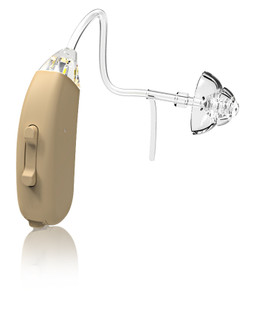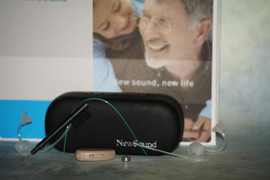Feast Your Ears A Guide to How Diet and Nutrition Impact Hearing Health
Posted by DR Paul on Jul 01, 2024
Did you know that what you eat could affect your ability to hear? Many people are unaware of the significant role diet and nutrition play in maintaining hearing health. Whether you're experiencing hearing loss or simply want to preserve your auditory abilities, understanding the connection between your diet and ear health is crucial. This blog post will explore the various ways in which nutrients can influence hearing and provide actionable tips to help you incorporate ear-friendly foods into your daily meals. By the end of this article, you'll have a clearer understanding of how to protect your hearing health through smart dietary choices.
Why Hearing Health Matters
Hearing is one of our most vital senses, enabling us to communicate, enjoy music, and stay aware of our surroundings. However, many people take their hearing for granted until they begin to experience hearing loss. Hearing loss can lead to social isolation, depression, and decreased quality of life. That's why it's essential to take proactive steps to protect your hearing health.
The Prevalence of Hearing Loss
Hearing loss is more common than you might think. According to the World Health Organization, over 466 million people worldwide have disabling hearing loss. This number is expected to rise to over 900 million by 2050. With such staggering statistics, it's clear that taking preventive measures is more important than ever.
The Impact of Diet on Hearing Health
While many factors contribute to hearing loss, including genetics and exposure to loud noises, diet is an often-overlooked aspect. Research has shown that certain nutrients can help maintain healthy hearing and even prevent hearing deterioration. Let's explore the science behind this connection.
Key Nutrients for Healthy Hearing
Certain vitamins and minerals are particularly beneficial for hearing health. Incorporating these nutrients into your diet can help protect your ears and improve your overall well-being.
Vitamin A
Vitamin A plays a crucial role in maintaining the health of the inner ear. It helps to form a protective barrier against infections and supports the regeneration of ear tissues. Foods rich in vitamin A include carrots, sweet potatoes, and leafy greens like spinach and kale.
Vitamin C
Vitamin C is a powerful antioxidant that helps protect the ear from oxidative stress, which can damage the delicate structures within the ear. Citrus fruits, strawberries, bell peppers, and broccoli are excellent sources of vitamin C.
Vitamin E
Another potent antioxidant, vitamin E, helps combat free radicals that can damage ear cells. Nuts, seeds, and vegetable oils are great sources of this essential nutrient.
Magnesium
Magnesium helps protect the inner ear from damage caused by noise exposure. It also supports overall ear health by improving blood flow to the ear. You can find magnesium in foods like almonds, spinach, and avocados.
Zinc
Zinc is essential for maintaining a healthy immune system, which can help prevent ear infections. Oysters, beef, and chickpeas are rich in zinc.
Omega-3 Fatty Acids
Omega-3 fatty acids, found in fish like salmon and mackerel, have anti-inflammatory properties that can help protect the auditory system. They also support overall brain health, which is closely connected to hearing.
Foods to Include in Your Diet
Incorporating a variety of nutrient-rich foods into your diet can help support your hearing health. Here are some examples of foods that are particularly beneficial for your ears.
Leafy Greens
Leafy greens like spinach, kale, and Swiss chard are packed with vitamins A and C, as well as other essential nutrients. They can help protect your ears from oxidative stress and support overall ear health.
Citrus Fruits
Citrus fruits like oranges, grapefruits, and lemons are rich in vitamin C, which can help protect your ears from free radical damage. They also provide a refreshing and tasty addition to your diet.
Fish
Fatty fish like salmon, mackerel, and sardines are excellent sources of omega-3 fatty acids. These healthy fats can help reduce inflammation and support overall ear health.
Nuts and Seeds
Nuts and seeds, such as almonds, walnuts, and flaxseeds, are rich in vitamin E and magnesium. They make for a convenient and nutritious snack that can benefit your hearing health.
Whole Grains
Whole grains like quinoa, brown rice, and whole wheat bread are good sources of zinc and other essential nutrients. They can help support a healthy immune system and prevent ear infections.
Dietary Habits to Avoid
While certain foods can support your hearing health, others can have a negative impact. Here are some dietary habits to avoid to protect your ears.
Excessive Salt Intake
Consuming too much salt can lead to high blood pressure, which can affect the blood flow to the ear and potentially damage the auditory system. Try to limit your intake of processed and salty foods.
High Sugar Consumption
High sugar consumption can contribute to inflammation and negatively impact your overall health, including your hearing. Reduce your intake of sugary snacks and beverages.
Unhealthy Fats
Trans fats and unhealthy saturated fats can contribute to poor cardiovascular health, which can, in turn, affect your hearing. Opt for healthier fats like those found in avocados, nuts, and olive oil.
The Role of Hydration
Staying hydrated is essential for overall health, including your hearing. Dehydration can affect the fluid levels in the inner ear, which can impact your balance and hearing abilities.
Drinking Water
Aim to drink at least eight glasses of water a day to stay hydrated and support your hearing health. Carry a reusable water bottle with you to ensure you always have access to water.
Hydrating Foods
Incorporate hydrating foods like cucumbers, watermelon, and strawberries into your diet. These foods have high water content and can help keep you hydrated.
Lifestyle Tips for Better Hearing
In addition to maintaining a healthy diet, there are other lifestyle changes you can make to support your hearing health.
Protect Your Ears from Loud Noises
Exposure to loud noises can cause permanent damage to your hearing. Wear earplugs or noise-canceling headphones in noisy environments, and keep the volume down when listening to music through headphones.
Exercise Regularly
Regular exercise can improve blood flow to the ears and support overall ear health. Aim for at least 30 minutes of moderate exercise most days of the week.
Manage Stress
Chronic stress can negatively impact your hearing. Practice stress-reducing activities like meditation, yoga, or deep breathing exercises to support your overall well-being.
How to Monitor Your Hearing Health
Regularly monitoring your hearing health can help you catch any issues early and take appropriate action.
Get Regular Hearing Checkups
Schedule regular hearing checkups with a healthcare professional to monitor your hearing health. Early detection of hearing loss can lead to more effective treatment.
Pay Attention to Warning Signs
Be aware of warning signs of hearing loss, such as difficulty understanding conversations, frequently asking others to repeat themselves, and ringing in the ears. If you notice any of these signs, seek professional advice.
Use Hearing Aids if Needed
If you have been diagnosed with hearing loss, using hearing aids can significantly improve your quality of life. Visit [hear-better.com] to explore a range of hearing aids that can suit your needs.
The Connection Between Diet and Overall Health
Maintaining a healthy diet is not only beneficial for your hearing but also for your overall health. A balanced diet can reduce the risk of chronic diseases, improve mental health, and enhance your quality of life.
Heart Health
A healthy diet can support cardiovascular health, which is closely connected to hearing health. Foods that promote heart health, such as fruits, vegetables, and whole grains, can also benefit your ears.
Brain Health
The brain and ears work together to process sounds. Maintaining a healthy diet that supports brain health, such as foods rich in omega-3 fatty acids, can also support your hearing.
Immune System
A strong immune system can help prevent ear infections and other health issues that can impact your hearing. Incorporate immune-boosting foods like garlic, ginger, and yogurt into your diet.
Conclusion
Your diet plays a significant role in maintaining your hearing health. By incorporating nutrient-rich foods, staying hydrated, and adopting healthy lifestyle habits, you can protect your ears and enjoy better hearing for years to come.
Remember, regular monitoring and professional checkups are essential for maintaining optimal hearing health. If you're looking for more personalized advice or need hearing aids, visit [hear-better.com] to learn more. Start taking care of your hearing health today for a brighter, more audible future.
By understanding the connection between diet and hearing health, you can take proactive steps to protect your ears and improve your quality of life. Make smarter dietary choices, stay informed, and enjoy the benefits of better hearing.










